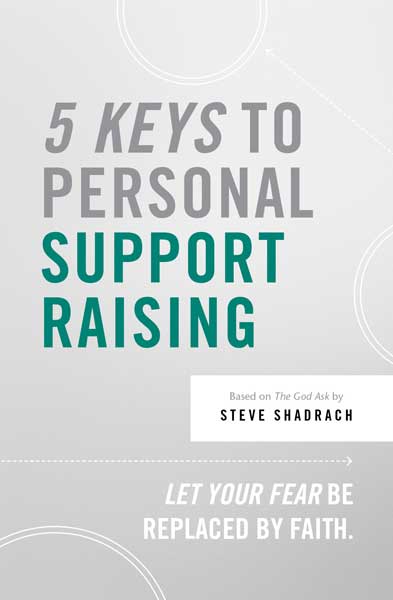Have you noticed that Jesus gave two different sets of instructions for funding ministry?
Early in His ministry Jesus sent both the twelve disciples and seventy others on mission trips. He instructed them to “take nothing for your journey” but to be supported by “worthy men” to whom they ministered (Matt 10, Mark 6, Luke 9, 10).
By contrast, just before He was crucified Jesus asked His disciples a penetrating question:
“When I sent you out without money belt and bag and sandals, you did not lack anything, did you? They said, ‘No, nothing.’ And He said to them, ‘But now, whoever has a money belt is to take it along, also a bag….’” – Luke 22:35-36 (emphasis mine)
The disciples said they had lacked nothing during these mission trips. Then Jesus says a change is coming. In a few days He commissions His disciples for a long term ministry trip—to make disciples of all nations—and now they are to prepare financially.
Travel light and be funded by the people to whom you go (Matthew 10) or prepare in advance (Luke 22). Which is it?
Let’s compare the contexts:
Matthew 10 |
Luke 22:35-38 |
|
|---|---|---|
| Duration | Short Term | Long term |
| Target | Jews only | All the world |
| Task | Preach Kingdom, heal sick, raise dead, cleanse lepers, cast demons |
Make disciples of all nations, baptize, teach all I taught you |
| Provision | No preparation | Prepare, don’t rely on hosts |
The Matthew 10 model of ‘not preparing’ was for a short-term mission to the Jewish culture which was committed to hospitality for traveling rabbis. But in Luke 22 Jesus is thinking of the entire world—not merely Israel. The Great Commission is long-term, and it is cross-cultural. Ministers must not rely on non-believing Gentiles to provide for them—prepare!
Paul agrees. He would not become a financial burden to the Greeks.
- “When I was present with you and was in need, I was not a burden to anyone….” –1 Thessalonians 2:9
- “When the brethren came from Macedonia they fully supplied my need….” –2 Corinthians 11:9
Fully supplied!
Is the “no preparation” model wrong? Not necessarily. If you minister within your own culture and that culture highly values caring for mission workers, then for the short term it might work. It did in Jesus’ day.
But today, when gospel-workers use the Matthew 10 model for long-term cross cultural ministry, the results are grim. They are usually poorly funded and their presumption that their new culture will support them is at the least undermining to their mission, and potentially dangerous.
“We’ll just trust the Lord to work it out when we get there,” they say. It is naive to assume that others will care for you just for showing up.
The decision on whether to use the strategy of Matthew 10 or Luke 22 is answered by Paul. His main concern in funding was that the gospel not be hindered (1 Corinthians 9:12—“cause no hindrance to the gospel.”)
But many gospel workers chafe against a full-funding policy—why?
- It takes too long and is too much work to reach 100% by a deadline.
- Missionaries tend to be the kind of people who don’t like rules
- They may have never developed an emotional connection with people in their ministry, so they struggle to articulate passion to donors who are viewed more as bank accounts than as critical prayer and financial partners.
Sometimes it is wise to allow mission workers to spend a month or two on their ministry site to ‘get a feel’ for the people. Then they can return home to attack their fundraising with renewed zeal. Fine.
If you cannot accept the Luke 22 Preparation Model, then what is your plan?
- Trust God to bring funding over time—grow into ministry? (How much time? Sadly, some missionaries have been ‘growing into ministry’ for 20 years and are still not fully funded.)
- Get a part-time job to support your ministry? (Can you do two things at once and do them well?)
- Tighten your belt and live on less? (Check with your spouse!)
- Wait for your disciples to support you? (Not Paul’s model!)
- Write to your friends back home to ask for more support? (Hmmm!)
Over the long haul, it is less stressful and more fruitful to launch ministry fully funded than to go partially funded and hope for the best.
Did Jesus contradict Himself? No. He used different strategies for different situations—and so must you. Jesus changed the game when He said, “but now!”
Takeaway—but now:
- Are you honestly planning to be at 100% funding? Yes or no?
- What can you do to launch your next phase of ministry fully funded?
EDITOR’S NOTE: We asked Scott Morton (International Funding Coach for The Navigators) to explain the background to his new book Blindspots: Leading Your Team and Ministry to Full Funding. Watch the webinar and read the story about how the book came about in his article Discovering Blindspots in Support Raising Leadership.


